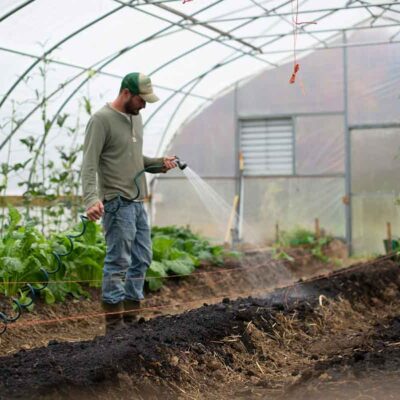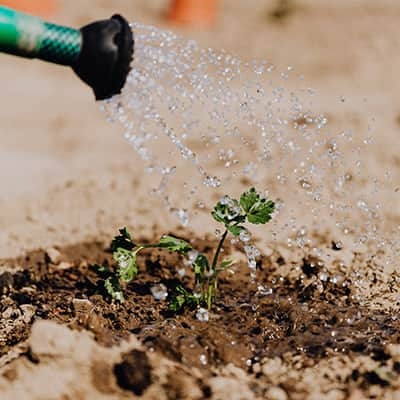5 Tips for Keeping Your Garden Thriving During the Summer Heat

Many plants thrive in summer heat, but that doesn’t mean you can take the same approach to gardening as in the spring. The summer season brings excessive heat that can take a toll on your plants. Even the hardiest varieties can suffer from exposure, a lack of hydration and many other issues. This blog will explore some hurdles you’ll face during the warmer months while providing valuable summer garden tips for beating the heat and helping your plants reach their full potential.
How is Garden Maintenance in Summer Heat Different?
The truth is that there’s a higher risk of plant failure in the summer. The intense heat creates bigger hurdles that your plants must overcome. While plants love the sun, excessive exposure can cause heat stress, wilting, scorching, etc. Pair that with the rapid rate of water evaporation, and many plants don’t receive the hydration they need to flourish.
Gardeners often respond to heat by over-watering. However, over-compensation can create even more headaches. In the end, many gardeners end up with an unproductive garden full of barely surviving plants. The key to garden maintenance in summer is planning. You must approach gardening differently, working around the hotter weather conditions to set your plants up for success.
The Importance of Choosing the Right Plants
One of the best things you can do to maximize success is to choose plant varieties that can tolerate summer conditions in your area. Putting a plant in your garden that predominantly grows outside your hardiness zone often leads to disaster. Summer conditions vary by location; failing to be mindful of what plants can handle will result in stunted growth or premature death.
No plant is immune to scorching temperatures, but many varieties and cultivars are better equipped to prosper in the summer heat than others. Choosing the right varieties to plant in your summer garden will make heatwave plan care much easier.
Summer Garden Tips That Will Help Your Plants Thrive
Keeping your garden healthy during the summer is no easy task. But these tips will empower you to take all precautions, ensuring you give your garden everything it needs to succeed.
- Choose the Right Soil: A healthy garden starts with high-quality soil. The right soil or potting mix makes all the difference. It can help retain water in the summer while offering adequate drainage. Plus, it can provide essential plant nutrients that give your plants the energy needed to beat the heat.
- Adopt Efficient Watering Practices: There’s a right and wrong way to water in the summer. When dealing with heat, you must prioritize deep watering. The goal is to provide enough water so that it seeps into the root zone, encouraging more resilience. It’s also important to water in the morning when temperatures are cooler to minimize evaporation.
- Use Natural Pest Control Methods: Pests can be a major headache in the summer, but you don’t have to resort to chemical pesticides. Inspect your plants regularly and use natural control methods like companion planting, proper spacing and organic repellents to keep bugs at bay.
- Provide Protection from Excessive Heat: Heatwave plant care sometimes requires shielding against severe exposure. Proper watering goes a long way, but scorching temperatures may call for sun shades to block the sun or mulching to regulate soil temperatures. Be mindful of heat waves and take action to prevent major issues.
- Give Your Plants Proper Nutrition: Plants often experience intense growth during the summer. Boosting your garden with pure plant nutrients can keep plants healthy and give them much-needed energy. Products like Super Boost 11-49-9 or Ultimate Thrive 5-0-2 from Supernatural Brand are great options that can encourage strong roots, germination, flowering and ripening.
Be Proactive for Optimal Summer Garden Health
The most valuable tip we can provide is to be proactive about your garden’s challenges. People encounter major problems when they treat summer gardening no differently than spring gardening. Recognize the hurdles you must overcome, plan early, adjust your gardening techniques and take action whenever necessary to keep your plants healthy.












